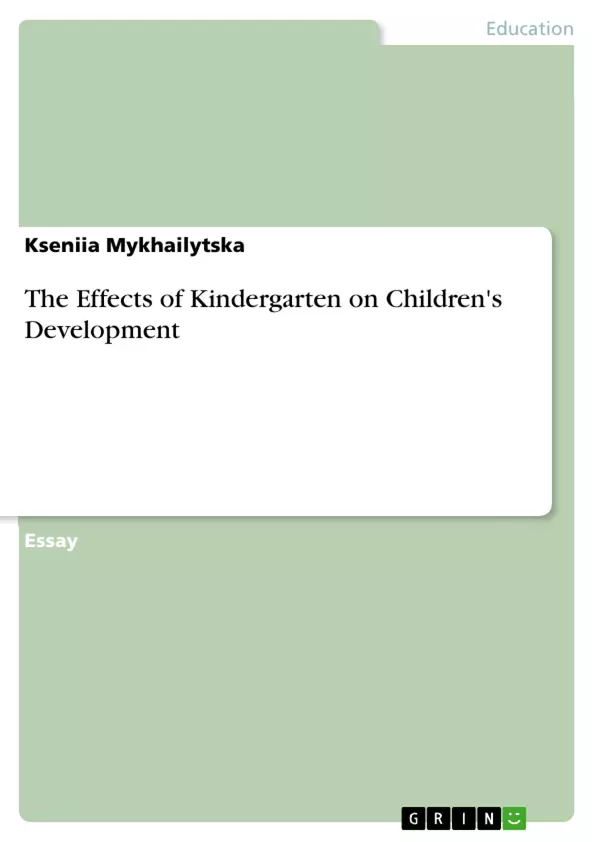Do parents make a wise decision sending their children to kindergarten? In the nineteenth century, the process of urbanization and social tendencies connected with it invoked the emergence of the first kindergartens in response to the needs of working parents. In the twentieth century, mostly in socialist countries, the preschool system became centralized. Nowadays, there are various care centers, nurseries, and preschools that are favored by parents; in Hungary, the Philippines, India, and Sudan, kindergartens are not only popular but compulsory. Parents often consider sending children to kindergarten as an effective way to prepare them for school, develop their communication skills and personality. But does preschool system live up to the expectations?
It is hard to find a study of the effects of kindergarten on children where there would be no reports about arising behavioral or communication problems. On the other hand, if kindergartens influenced children apparently in a negative way, they would not be so popular. According to UNESCO Institute for Statistics, by 2005, more than one hundred thirty-two million children were enrolled in preschool programs worldwide. Obviously, the outcomes of attending kindergartens and care centers depend largely on the quality of the program and educators’ personal identity and qualifications. However, the debates about the general effect of preschool institutions continue. While some parents consider kindergarten as essential childhood experience for their kids, others believe it is better for their children to escape the influence of preschool.
Inhaltsverzeichnis (Table of Contents)
- Kindergarten - Good or Bad Idea?
- Parents' Expectations
- Arguments for Attending Kindergarten
- Qualified Care
- Social Skills Development
- Preparation for School
- Arguments Against Attending Kindergarten
- Detrimental Effects on Children's Behavior
- Unnatural Environment
- Questionable Effects on Cognitive Development
- Resolving the Controversy
Zielsetzung und Themenschwerpunkte (Objectives and Key Themes)
This paper explores the ongoing debate surrounding the benefits and drawbacks of attending kindergarten. The author aims to analyze the arguments of both proponents and opponents of preschool education, examining the potential impact on children's social, cognitive, and emotional development.
- The Importance of Qualified Care for Children's Development
- The Role of Social Interaction and Peer Groups in Preschool
- The Relationship Between Kindergarten Attendance and Academic Success
- The Potential Negative Effects of Preschool on Children's Behavior and Emotional Well-being
- The Need for a Balanced Approach to Preschool Education
Zusammenfassung der Kapitel (Chapter Summaries)
The paper begins by outlining the historical context of kindergarten and its increasing popularity worldwide. It then explores the motivations of parents who choose to send their children to preschool, highlighting the perceived benefits of qualified care, social skills development, and preparation for school.
The author then presents the opposing viewpoint, examining concerns about the potential negative effects of preschool on children's behavior, emotional well-being, and cognitive development. Arguments are presented based on research findings suggesting that preschool attendance may lead to increased stress, behavioral problems, and a potential short-term impact on academic achievement.
The paper concludes by suggesting that the key to resolving the controversy lies in finding a balanced approach to preschool education. The author emphasizes the need for individual attention, parental involvement, and a limited amount of time spent in preschool to mitigate any potential negative effects while still allowing for socialization and early learning opportunities.
Schlüsselwörter (Keywords)
The main keywords and focus topics of the text include: preschool education, kindergarten, social development, cognitive development, behavioral problems, qualified care, parental involvement, homeschooling, stress, academic achievement, and balanced approach.
Frequently Asked Questions
What are the main arguments in favor of attending kindergarten?
Proponents argue that it provides qualified care, fosters social skills through peer interaction, and effectively prepares children for the academic demands of school.
What concerns do opponents of early preschool education have?
Critics worry about potential negative effects on behavior (increased aggression or stress), the unnatural environment, and questionable long-term benefits for cognitive development.
How does the quality of a program affect the outcome?
The effectiveness of kindergarten depends heavily on the qualifications and personal identity of the educators, as well as the specific curriculum and teacher-to-child ratio.
Is kindergarten compulsory in all countries?
No, but it is mandatory in some countries like Hungary, the Philippines, India, and Sudan, while being optional but popular in many others.
What is the "balanced approach" suggested in the paper?
It suggests combining limited preschool time with high parental involvement and individual attention to maximize socialization benefits while minimizing stress.
- Citation du texte
- Kseniia Mykhailytska (Auteur), 2016, The Effects of Kindergarten on Children's Development, Munich, GRIN Verlag, https://www.grin.com/document/323012



